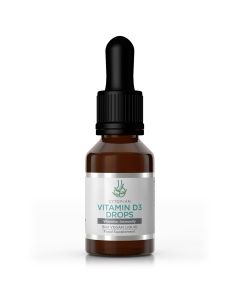Does vitamin D help protect against the common cold?
What is the “common cold”?
The “common cold” is a collective term for a range of mild upper respiratory illnesses, caused by a number of different viruses, and as the name suggests, it is extremely common. Adults can expect to get 2-4 colds a year, older children 5-6 colds and infants and young children can often catch as many as 12 colds a year. Symptoms can include a runny nose, coughs, sore throat, headache and fatigue. Colds typically last around 10 days and can often be a significant burden on quality of life.
As we are heading into autumn and winter, when you are around 4 times more likely to catch a cold than in summer, now is the time to focus on supporting your natural immunity. Maintaining a strong immune system can reduce your chances of catching a cold, shorten the duration of illnesses and lessen the severity of any symptoms. Ensuring optimal levels of vitamin D is one of the ways you can support optimal immune defences.
What is vitamin D?
Known as ‘The Sunshine Vitamin’, sunlight is necessary for the synthesis of vitamin D in the skin and those lacking in sunlight are at high risk of deficiency. Vitamin D is not found in abundance naturally in foods, so simply put, not enough sunshine means not enough vitamin D, and hence low levels are common in the UK. The amount of sunlight (UV) we are exposed to in the winter months is insufficient and over the winter we need to draw on our bodily reserves.
Typically regarded as a nutrient to support skeletal health, the pivotal role of vitamin D in immune health is now being explored, particularly as a result of the COVID-19 pandemic.
How does vitamin D support immunity?
Historical evidence that links vitamin D with immune health came from the reports in the mid-1800s and early 1900s, prior to the antibiotic era, that vitamin D3-rich cod liver oil and sunlight exposure were used for the treatment of tuberculosis (TB).
Vitamin D supports our natural immune defence in a wide range of ways. Immune cells, including B lymphocytes (which make antibodies) and T lymphocytes (which orchestrate the immune response), all carry specific vitamin D receptors. Vitamin D helps to activate macrophages – hunter-killer cells that engulf and destroy pathogens (known as “big eater” for a reason!) – and stimulates production of natural antimicrobials that help protect against bacteria and viruses.
The large amount of research on the topic of immunity and vitamin D has found that lower levels of vitamin D are associated with a higher risk of catching a cold and that supplementing with vitamin D offers a safe and effective strategy to protect against colds, as well as reducing the duration and severity of symptoms when they do occur.
How much vitamin D do you need?
In the UK, vitamin D can be synthesised in the skin between April and September, 10.00 am to 2.00 pm, on sunny days (i.e. without cloud cover). How efficiently we product vitamin D depends on genetics, age, sunscreen, clothing, and skin colour and the availability of co-factors such as vitamins A, B2, C and K, magnesium, selenium, and zinc. Although vitamin D cannot be synthesised during the winter at our latitude, it can be stored in the body, and it is important that our stores are adequate heading into the autumn/winter period.
Here in the UK, the current government advice is for all adults and children to consider taking a daily 10 micrograms (400IU) supplement of vitamin D between October and March. Some at-risk groups are advised to consider taking a supplement throughout the year. These recommendations are based on the role of vitamin D in calcium absorption and bone health, but evidence suggests that higher levels might be needed for optimal immunity.
It is possible, however, to have excessive and therefore toxic levels of vitamin D, so we would suggest that if taking more than 5000 IU per day for more than 3 months, then vitamin D levels should be checked regularly, especially during the summer months.





